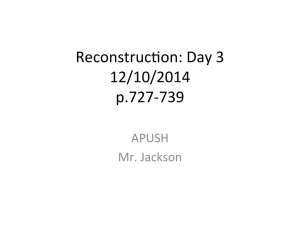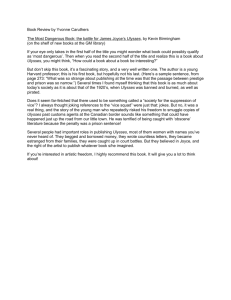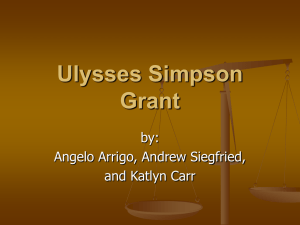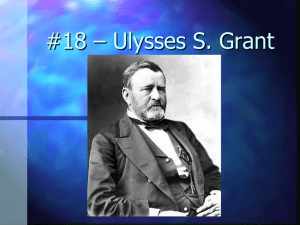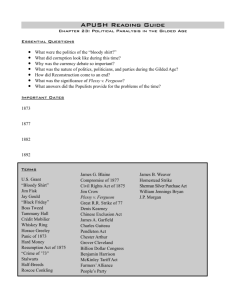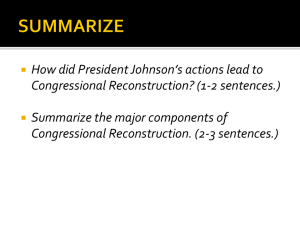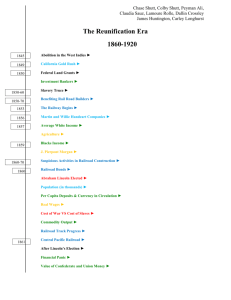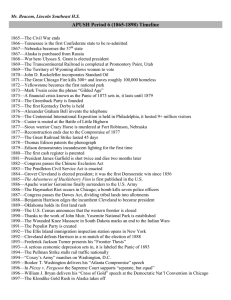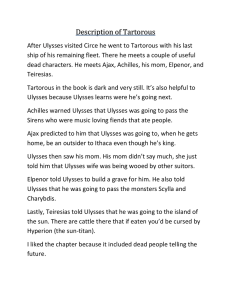President Ulysses S. Grant
advertisement
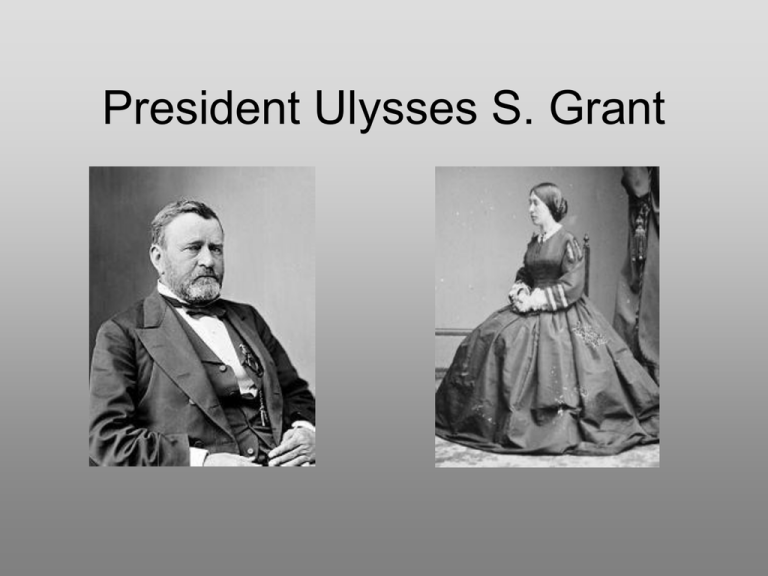
President Ulysses S. Grant Ulysses S. Grant • Ulysses S. Grant, (April 27, 1822 – July 23, 1885), was an American general and the eighteenth President of the United States serving two terms. (1869–1877). • He achieved international fame as the leading Union general in the American Civil War, capturing Vicksburg in 1863. • He accepted the surrender of his Confederate opponent Robert E. Lee at Appomattox Court House. The Grant Family • On August 22, 1848, Grant married Julia Boggs Dent (1826–1902), the daughter of a slave owner. • They had four children: -Frederick -Ulysses, Jr. -Ellen (Nellie) -Jesse. President Grant • The first president from Ohio, Grant was the 18th President of the United States and served two terms from March 4, 1869, to March 4, 1877. • In the 1872 election he won by a landslide against Horace Greeley. President Grant • Grant presided over the last half of Reconstruction. • He supported amnesty for Confederate leaders and protection for the civil rights of African-Americans. • He favored a limited number of troops to be stationed in the South to protect rights of Southern blacks, and suppress the violent tactics of the Ku Klux Klan. President Grant • In 1869 and 1871, Grant signed bills promoting voting rights and prosecuting Klan leaders. • Grant signed a bill into law that created Yellowstone National Park (America's first National Park) on March 1, 1872. Panic of 1873 • At the end of the Civil War, there was a boom in railroad construction, with 35,000 miles of new track laid across the country between 1866 and 1873. • The railroad industry, at the time the nation's largest employer outside of agriculture, involved large amounts of money and risk. Panic of 1873 • A large infusion of cash from speculators caused abnormal growth in the railroad industry. Many people had invested heavily in the railroads. • President Ulysses S. Grant's policy of contracting the money supply made matters worse. While businesses were expanding, the money they needed to finance it was becoming more scarce. Panic of 1873 • Entrepreneurs had planned to build a second transcontinental railroad, called the Northern Pacific Railway. Firms that provided the financing, had become overextended and declared bankruptcy. • This caused a major upset to the economy of the United States. Post Presidency • After the end of his second term in the White House, Grant spent two years (1877 to 1879) traveling around the world with his wife. • He visited Ireland, Scotland, and England; the crowds were huge. • The Grants dined with Queen Victoria at Windsor Castle and with Prince Bismarck in Germany. • They also visited Russia, Egypt, the Holy Land, Siam, and Burma. In Japan, they were cordially received by Emperor and Empress at the Imperial Palace. • Today in Tokyo, a tree still stands that Grant planted during his stay. Last Days • In 1881, Grant purchased a house in New York City. • Grant learned at the same time that he was suffering from throat cancer. • Grant lost most of his money in an investment deal after his presidency. • At the time retired U.S. Presidents were not given pensions, and Grant had forfeited his military pension when he assumed the office of President. Last Days • It was not until 1958 that Congress, feeling it inappropriate that a former president or his wife might be poverty-stricken, passed a bill granting a pension to such individuals, a practice that continues to this day. Last Days • Mark Twain offered Grant a generous contract for the publication of his memoirs, including 75% of the book's sales as royalties. • Terminally ill, Grant finished the book just a few days before his death. The Memoirs sold over 300,000 copies, earning the Grant family over $450,000. Grant’s Death • Ulysses S. Grant died on Thursday, July 23, 1885,at the age of 63 in New York. • His last word was a request, "Water." • His body lies in New York City's Riverside Park, beside that of his wife, in Grant's Tomb, the largest mausoleum in North America. Grant’s Tomb
